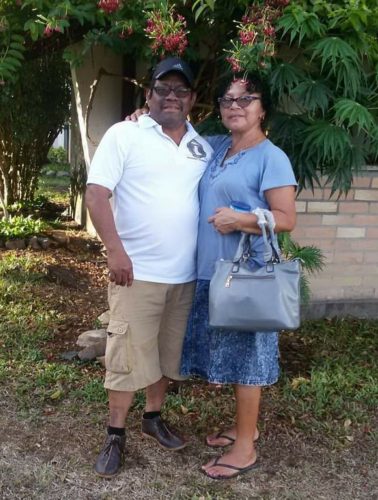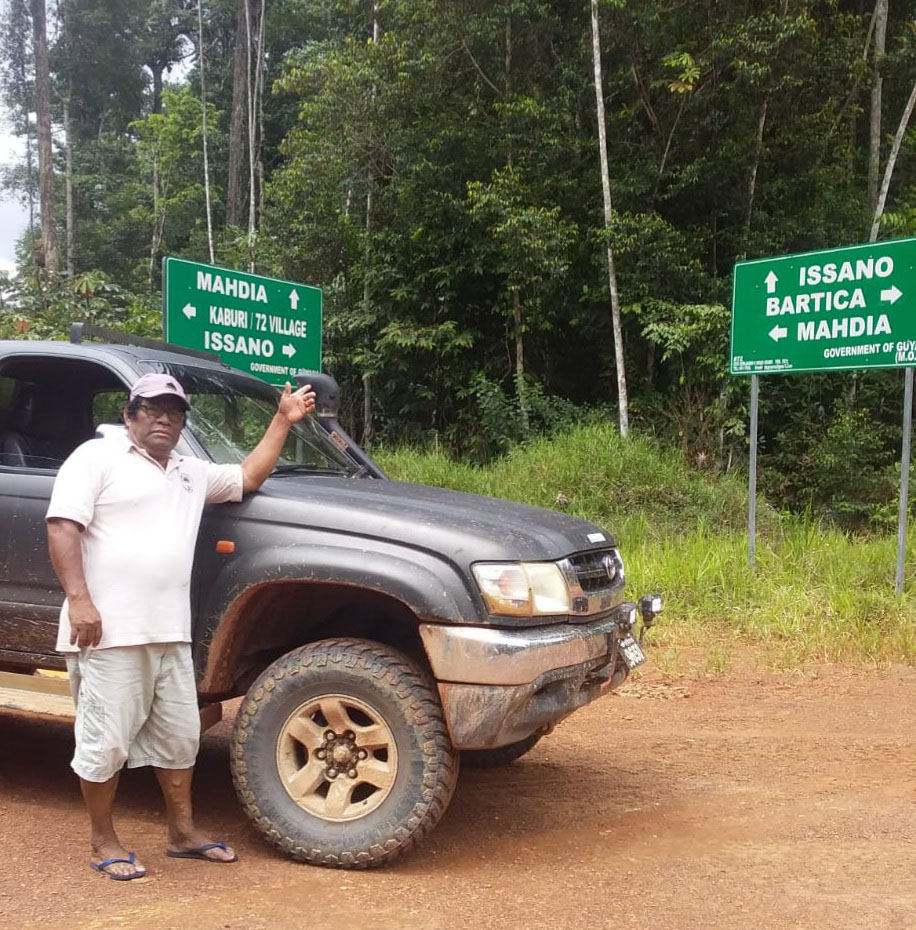Although he may not have known it at the time, when Bonaventure Fredericks was hired as the office assistant for the Region Eight (Potaro/Siparuni) Regional Democratic Council (RDC) office in 1981, he was getting a practical education that would eventually land him in the seat of the Regional Chairman some 34 years later.
Fredericks, popularly known as ‘Brother Bonny’ or ‘Brother Venture,’ 58, said his experiences over the ensuing years, when he also served as a driver and community activist, helped him to understand the challenges he would have to face.
“As an employee of the region and travelling with the REOs and other regional chairmen gave me a front view seat to see the challenges,” Fredericks told Stabroek Weekend.

“The experience I gained interacting with people from the little settlement where I was born, to travelling the region as a driver of the RDC helped me to see the challenges regional chairmen who served before me faced,” he said.
Fredericks, who took up the highest political office in Region Eight in 2015 for a five-year term under the A Partnership for National Unity+Alliance For Change (APNU+AFC) government, said, “I was never a politician but someone who always loved getting things done for my community and the region. Taking up the political office at the time was my way of giving back.”
Fredericks was born in the settlement of Sand Hill, an extension of the Patamona village Waipa on the Ireng River in Region Eight, topside of Orinduik Falls.
His grandparents moved from Sand Hill to Mahdia in the late 60s to seek out a better way of living and his parents followed them to Mahdia around 1970/1971.
He went to primary school in Mahdia for a year or two and then his family again moved to 72 Miles, also called Kaburi Village on the Bartica/Potaro Road, in Region Seven (Cuyuni/Mazaruni).
“I moved about a lot in my childhood. I completed my primary education at 72 Miles. One of the challenges I faced in life was that my parents could not afford to have me educated beyond the primary school level.”
On completing his primary education, Fredericks worked as a pupil teacher at 72 Miles Primary School. Life at Number 72 in those days was better than today, he said.
“It was easier to hunt, fish and to sell what we caught. We had cassava and ground provision, so it wasn’t really bad. It was in the days when the government was attempting to use hydro-electricity for powering the country. People moved through the area to get to Issano and other places for gold and diamond mining, as well as to get to Mahdia. It was a hub.”
However, his grandparents, who had settled in Mahdia, encouraged him to return there to get “proper” employment.
At Mahdia, Fredericks was taken on as an office assistant to the Office of the RDC. He served for three years in that post after which he was appointed a stores clerk.
“Those days things were hard in Guyana. The cost of living was high in Mahdia because it was a mining area. However we got a lot of contraband stuff coming to Mahdia from Venezuela but you still had to have money to buy the contraband stuff.”
At the time he was earning less than $154 a fortnight. To supplement his income he had to find other forms of employment.
“I did lumbering in between my job at the RDC and tended a kitchen garden as well. Some weekends, I would pick up my battel and go to the creek and punt. Sometimes I would pick up a half pennyweight or more of gold, which would carry me some way. In those days you could have gone anywhere with your battel and find gold. It’s not like that today. The lands are taken over by mining concessions and mined out.”
While he was working as a stores clerk, he said, one day, the then Assistant Regional Administrative Officer Sherlock Isaacs called and told him, “Brother Venture, I will be glad if you can move all these vehicles. Park them in an orderly manner.”
Fredericks, who noted that there were trucks, tractors and jeeps all over the government’s compound, recalled telling Isaacs that he did not know to drive. “I had been longing to learn to drive and I told Mr Isaacs. He told the drivers in the Works Department to teach me to drive and they did. That was how I learned to drive every vehicle that was in the government compound.”
‘The utility person’
Learning to drive had been a highpoint in Fredericks’ life. “If a man could just call you out one day and tell you that you have to learn to drive—he provides you with the opportunity to do one of the things you really wanted to do in life—wouldn’t you want to give that opportunity to others, too?”
If Isaacs could have helped him, Fredericks said, he was inspired to help other young people and has shared his driving skills with many including young Indigenous People.
“I have taught many drivers and operators who are scattered all over the country, working in mining and in other professions. Many are doing well, and some, in turn, are helping their people and communities.”
As officer assistant, Fredericks recalled, people gravitated towards him because of his friendly disposition and sought his help in accessing regional office holders to get their problems aired or solved.
“I got to know some of their issues and how they were being helped. I learned along the way. This exposure led me to community activism in Campbell Town, Mahdia, which I had made my home. (He had married Catherine Baird in 1990, a resident of Campbell Town and became a resident of the village.) I became known to owners of businesses, non-governmental organisations and religious organisations, even though he was just the office assistant.
“Every vacation I would go back to Number 72 Miles, which was home for me, and I would meet people wherever I go who would later on become good contacts.”
When there was community work to be done, which was done mostly be self-help, Fredericks was there. “I was seen as the ‘utility person.’”
In times of flooding or small disasters, such as road blockage caused by landslide or fallen trees and a breakage in the roads, he would be called on by the community to help out. This was and still remains so, because he could drive and operate a number of heavy duty machinery including trucks, excavators, and tractors, and he could operate chain saws.
“Many times, I would be among the first to be called on and the first to respond whether it was the regional administration or the community calling. So I worked closely with the administration and the communities around central Mahdia. I did these things voluntarily, sometimes as part of a team, even though they were not a part of my scope of work as stores clerk. We are there as long as it benefits the community.”
In 2000, Fredericks took a break from the public service and worked with a private entity in Mahdia.
When Peter Ramotar, brother of former President Donald Ramotar, was appointed Regional Executive Officer for Region Eight, he needed a driver and so Fredericks was again employed with the RDC. Then in 2011, after Ramotar left, he was offered a position to manage the Guyana Oil Company (Guyoil) gas station in Mahdia. At the time he was earning $35,000 a month as a driver and he was being offered $90,000 a month so he accepted the Guyoil offer.
“I had a wife and five children along with three grandchildren in the home. I did what was best at the time.”
Village councillor, regional chairman
In May, 2005, he was first elected a councillor for the Princeville and Muruwa areas in Campbell Town. In the last village council elections held in May, Fredericks was once again elected the councillor for the communities of Princeville and Muruwa. Princeville is seven miles from Campbell Town and Muruwa is 40 miles away from Campbell Town. He said he was asked to run for the post of toshao but declined because he felt that others need to take up the reins of leadership in the community.
The village council has a 15-seater mini-bus, a canter and two pick-up trucks, of which he is in charge. With these vehicles, he has to ensure that pensioners from the different communities collect their pensions at Mahdia and that children are transported from Princeville to Mahdia Secondary School. This is because there is not adequate accommodation for children at the dormitories in Mahdia.
It was while he was working as the manager of the Guyoil gas station at Mahdia, that Fredericks in 2015 became the Chairman of Region Eight RDC under the APNU+AFC government.
“I was never a card bearing member of any political party but I was always someone trying to assist and to make a difference in someone’s life and developing my community and the region. I always gave support to the government of the day.”
However, in the run up to the election he gave his name up as a candidate on the APNU+AFC regional list. So when his name came up for the position of Chairman for Region Eight, Fredericks said after consulting with family members he took on the job.
One of the first problems he encountered as chairman, he said, was resolving the issue of transportation for some 20 students to attend the Bina Hill Institute at Annai in Region Nine- Upper Takutu/Upper Essequibo and 28 secondary student to Sand Creek Secondary School, also in Region Nine.
To travel from Kanapang, Taruka, Tuseneng, Monkey Mountain, Itabac, Kurukubaru, Kaibarupai and Kopinang took the students five days of walking and by truck to get to their institutions of learning. The cost for a truck to transport them was $350,000. The reason why students could not attend Mahdia Secondary was because of overcrowding and not having sufficient dormitory places for the children from these areas hence the need to take up available places at Sand Creek.
Knowing the terrain for these areas as he had been given the task by the RDC in his previous post to take in 40 ATVs (All Terrain Vehicles) to various parts of Regions Seven and Eight for the ministries of health, Amerindian affairs and local government, Fredericks was familiar with the dangerous terrain these students face from the topography, elements and wildlife. His office sought to put measures in place for the students to gather at the nearest airstrips to their homes, flown to Mahdia and from there transported by bus to Annai and Sand Creek. All of which was done within a day or two.
Another challenge, he said, was rebuilding Kaibarupai, Sand Hill and parts of Waipa that were washed away in floods during 2017.
“We had to land by aircraft at Orinduik and travel by boat to go upriver to assess the damage, provide relief and then assist with recovery.”
Even though there were negatives during his term in office, Fredericks said the positives outweighed them. “I rest comfortable now knowing that I did my job to the best of my ability.”
“I am familiar with the Indigenous Peoples way of life so I was able to get the support of the people in the North Pakaraimas. We spoke the same Patamona Language and we understood each other. I was able to sit down, eat, drink and work along with them. They became very involved in their own development and helped me to bring other forms of development to their communities, especially as it pertained to health, education and infrastructure.”



